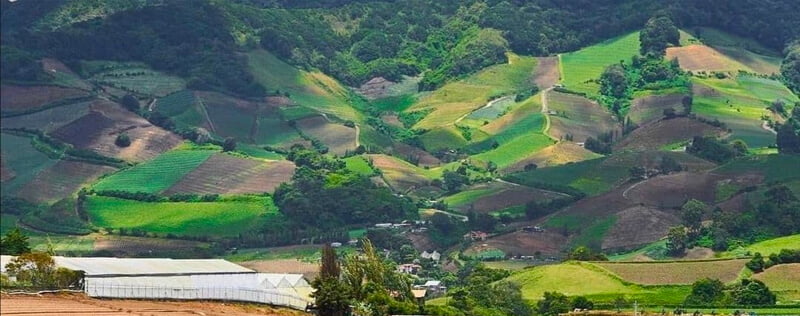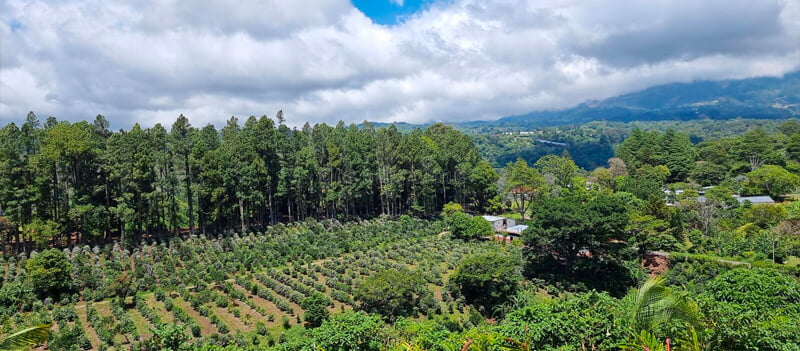Chiriqui – The first place to successfully grow wild Ethiopian coffee
– FIND OF ORIGIN –
Chiriqui is a northwest province near the Costa Rican border, and home to Panama’s best. This place is famous as a mecca that creates a commercial flavor for Ethiopian coffee with the best coffee plantations on the planet. What is particular about this land? Let’s explore with us right away.
Ideal growing conditions for Ethiopian coffee varieties
Landforms of Chiriqui
Chiriqui brings together the ideal conditions for rare coffee varieties to grow. Like owning hundreds of miles of beaches and beautiful plateaus stretching from low to high with hot springs, the volcano towered with vast fields and lush jungle. In particular, Chiriqui is famous for the surprising diversity of vegetation and animals at the Barú volcano, with an altitude of up to 3,474m, and La Amistad International park.
Besides, the most prominent must be mentioned, the premium Ethiopian coffee plantations that the whole world dreams of. The best quality must be mentioned in three main growing areas: Boquete, Volcán, and Renacimiento. These mountain towns with unique climates and advantages, helping the coffee variety best express its distinctive and characteristic essences and strengths that nowhere else has. As a result, Chiriqui Province remains the main specialty coffee-producing region in Panama until now.

Internationally recognized geisha coffee producer
Ethiopian coffee in Chiriqui is mainly grown in the highlands around the Barú volcano. This place has an absolute advantage in altitude, fertile volcanic soil from eruptions millions of years ago combined with the climate of the rainforest plateau. These nature-given factors help control pests and diseases, limit factors that hinder growth, and create an ideal environment for famously hard-to-grow coffee varieties like Gesha to promote their inherent advantages. So Ethiopian coffee in this small and beautiful land of Chiriqui is often of outstanding quality with the number one high price on the market (over $ 800 / pound). Today Chriqui is known as the world-recognized world-recognized first-class flavored Gesha growing place.

The journey to enhance the taste of Ethiopian coffee
In the past, Gesha was unpopular because of its difficulty growing and low yields. It took several decades for the unique flavor of this Ethiopian coffee variety to be discovered and flourish. This type of coffee was introduced to Panama by European immigrants in the late 19th century. Fascinated by the pure, unspoiled beauty, they chose Chiriqui as the first area to grow this traditional coffee variety. Initially, coffee was susceptible to pests and diseases and underdeveloped due to being produced in low-altitude coastal regions. It was later moved to higher areas, such as Boquete, Volcán, and Renacimiento of the Chriqui Province. Here Ethiopian coffee now seems to find the right place to go. The “red ladies” grow more substantial and have a delicate, delicious taste with pure characteristics from the growing region.

Living in a favorable environment, Gesha possesses a unique, vivid, complex fragrance that is attractive. However, Gesha’s output has mostly stayed the same compared to before. But thanks to the appeal of the taste, quality makes it sought after and made especially rare as the special edition globally. The amount of demand exceeding supply as a result of this leads to the price of this type of coffee in the Chiriqui region escalating daily and in the top of the most expensive coffees on the planet.

It is undeniable that Chiriqui is the place to elevate the taste of wild Ethiopian coffee. After a long journey, it has joined the ranks of expensive and powerful “Specialty coffee.” High value coupled with a warm welcome from all over the world has brought great benefits to the environment and premium coffee industry workers. The profits have contributed to significant improvements in farmers’ lives and sustainable improvements to farms, plateaus, and ancient forests in Panama and worldwide.
Related posts:
– Enjoy the full taste of nature through Lycello Filter













